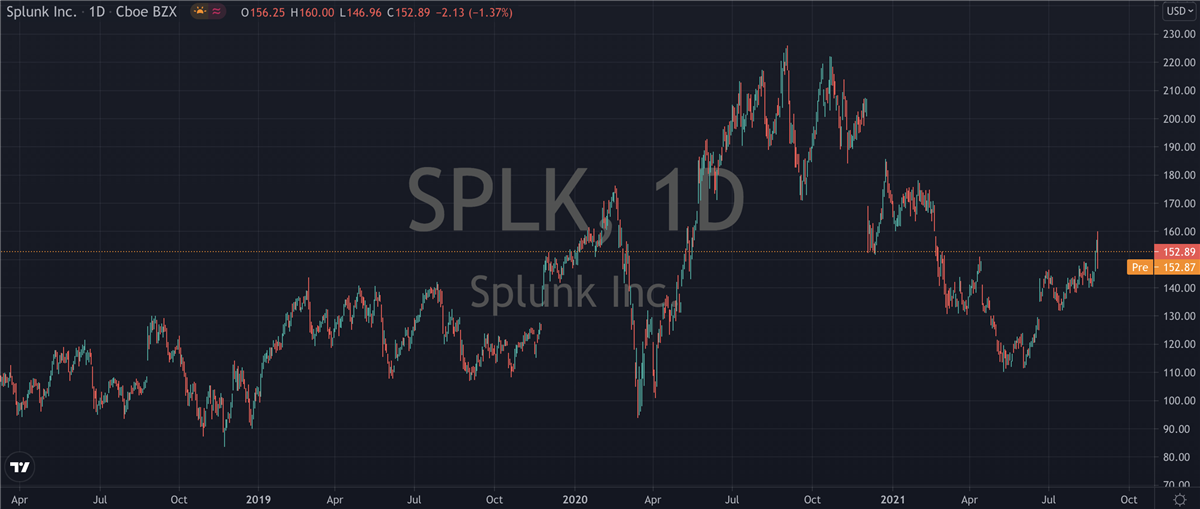Unlike many of their peers in the tech and data industry, shares of
Splunk (NASDAQ: SPLK) failed to hold onto most of the gains they earned in 2020. To be sure, they rallied out of the pandemic-fueled crash with the best of them starting in March of last year, posting a 140% jump through August 2020. But rather than consolidating and pushing on like their competitor Datadog (
NASDAQ: DDOG) did for example, they went on to give up 50% of their value into June of this year.
That had Splunk shares trading not only close to their lows of the previous years’ crash, but also below where they were before the pandemic even hit, a statistic not many other tech companies can, or would want to, claim. But for all that, the pros of owning Splunk shares are quickly starting to outweigh the cons, and for those of us on the sidelines, there are
more than a few arguments for starting to consider buying into the San Francisco headquartered company.
Fresh Numbers
Dodgy earnings reports played a role in the stock’s fall over the past year, but their most recent earnings report has the potential to fuel a fresh rally. The numbers for Q2 were released after the bell on Wednesday of this week, and gave investors plenty to chew on. Revenue was up more than 23% compared to the same quarter last year, and well ahead of what analysts had been expecting. Bottomline GAAP EPS was in the red as it missed the consensus and showed the company to still be a while away from turning over a consistent profit.
Aside from that miss, it was mostly positive, however. Annual recurring revenue (ARR) from their cloud segment was up 72% year over year, driven in part by new large customer acquisition which showed the number of customers paying more than $1 million a year up close to 50%. There can be no doubt that the company’s shift towards cloud is gathering some serious momentum. Management also gave Wall Street one of the most bullish signals they could by raising forward guidance for Q3 well beyond previous figures. With all this in mind, it’s easy to see the argument for Splunk being undervalued compared to the potential in these numbers.
Their shares rallied 30% from June into July but then traded largely sideways until this week’s earnings report. They’ve jumped up a further 10% since then and look set to be well on their way to reclaiming the heights of last year. The prevailing feeling is that “barring a catastrophe Splunk will soon be profitable again.” And with a rising net retention rate and encouraging figures from its transition to a cloud-based subscription model, there is a good chance investors will one day look back at these prices and regret not getting involved.
Long Term Potential
It’s fair to say that the ongoing transition to the cloud has hurt the stock, and investors haven’t been patient, but that also means an opportunity has been opened up for those of us on the sidelines. Splunk’s platform is used by some of the biggest logos in the world and the company is going nowhere. In a sign of their consistent market penetration, they were recently named the industry leader in Security Information and Event Management by Gartner for the eighth time. The stock’s price-to-sales ratio is close to 10 and as low as it’s been in the past decade suggesting that even on a fundamental basis the stock is a screaming buy right now.
Both UBS and Mizuho have been out with bullish comments on the stock recently, the former upgrading them from a Neutral to a Buy rating earlier this month while giving them a fresh $175 price target. Even with this week’s pop, that suggests there’s still upside of close to 15% to be had. In light of this week’s earnings and the stock’s reaction, don’t be surprised if we see more analyst upgrades in the near term. Splunk’s long term growth potential is starting to be recognized and the stock looks like it
wants to start mirroring that again.

Unlock the timeless value of gold with our exclusive 2025 Gold Forecasting Report. Explore why gold remains the ultimate investment for safeguarding wealth against inflation, economic shifts, and global uncertainties. Whether you're planning for future generations or seeking a reliable asset in turbulent times, this report is your essential guide to making informed decisions.
Get This Free Report
Like this article? Share it with a colleague.
Link copied to clipboard.